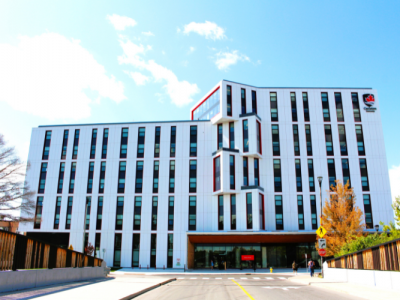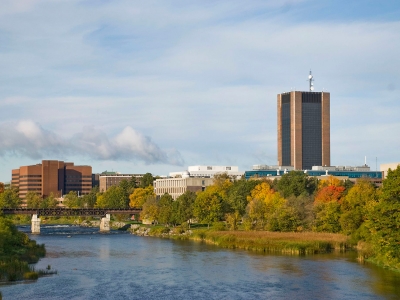Five Carleton University researchers received a combined $1.25 million in support from the Exploration stream of the New Frontiers in Research Fund (NFRF) to support high-risk, high-reward research in the areas of intelligent robotics, digital integration in the architecture, engineering and construction (AEC) industries, air quality and climate change policy, evolutionary transitions in amphibians, and Parkinson’s disease.
“Carleton’s outstanding researchers and their important work have been recognized by the prestigious NFRF program. We applaud their incredible vision and are proud to support them,” said Rafik Goubran, vice-president (Research and International). “These projects have the potential to greatly impact the lives of Canadians and represent several multidisciplinary areas of research strength in which Carleton excels.”
The Exploration stream supports research that is not easily funded elsewhere. It seeks to inspire projects bringing disciplines together beyond traditional disciplinary or common interdisciplinary approaches by research teams with the capacity to explore something new with the potential for significant impact.
Robin Chhabra, Canada Research Chair in the Mechanical and Aerospace Engineering Department, is helping to develop the robotic mind equipped with a set of developmental functions, including synthetic emotional investments which will enable robots to become conscious of their bodies, the surrounding environment and relationships linking the two. He studies neuropsychological changes in interactive brains, during both sleep and wakefulness states, to offer solutions for adaptability and flexibility in reconfigurable and fault-tolerant robotic systems. This research not only sheds light on our understanding of some neurological syndromes, but it also has the potential to contribute to boundless applications in manufacturing, health, automotive, transportation and aerospace industries.
Built and digital environments are becoming inextricably intertwined—with building information modelling (BIM) and Smart City technologies emerging as some of the first manifestations of this relationship. Stephen Fai, professor in the Azrieli School of Architecture and Urbanism and director of Carleton Immersive Media Studio (CIMS), is investigating the concept of a “digital twin” for Canada. With an interdisciplinary team, Fai will develop a road map for Canada that considers technological, social and cultural imperatives. He will create a strategic framework to support Canada’s architecture, engineering and construction industry in becoming a world leader in digital construction research and innovation.
Global climate change and poor air quality are two of the main environmental challenges of modern times. While the causes of climate change and air pollution overlap, policies to address them are often examined and developed independently from one other. Amir Hakami, a professor in the Department of Civil and Environmental Engineering, will provide a framework to better use quantitative, sectoral and location-specific benefits to guide climate policies towards maximizing societal health from air quality improvements.
Hillary Maddin, professor in the Department of Earth Sciences, will bring together the fields of experimental developmental biology and paleontology, along with new computational machine learning methods, to help answer outstanding questions about the evolution of vertebrates transitioning from water to land. The development of two new model organisms will fill a knowledge gap in vertebrate development and will lead to a better understanding of complex vertebrate transitions.
Almost 150 years after the identification of Parkinson’s disease, there are few treatments and no cures. By focusing on the contribution of non-neuron cells to this disease and employing new interdisciplinary techniques and approaches, Natalina Salmaso, Canada Research Chair in Behavioural Neurobiology in the Department of Neuroscience, will reveal new cellular targets for treatment.
Media Contact
Steven Reid
Media Relations Officer
Carleton University
613-265-6613
Steven.Reid3@carleton.ca
Follow us on Twitter: www.twitter.com/Cunewsroom
COVID 19 Updates: https://newsroom.carleton.ca/coronavirus-covid-19/messages/
Wednesday, September 16, 2020 in News Releases
Share: Twitter, Facebook



